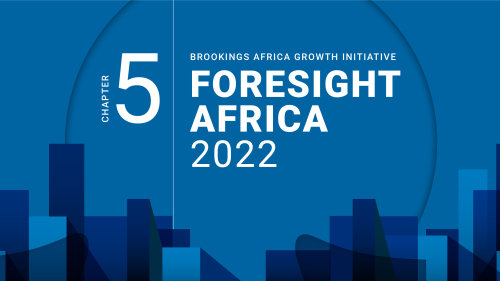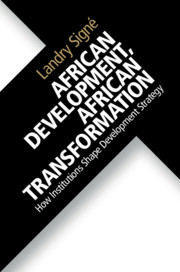Innovation should be given the place it deserves during this year’s Africa Week, which is organized on the margins of the United Nations General Assembly Debates on Africa’s Development and focuses on Supporting an Integrated, Prosperous, People-centered, Peaceful Africa: Towards the implementation of Agenda 2063 and the 2030 Agenda for Sustainable Development.
Innovation is recognized as a major force for economic growth and development. However, when experts speak about innovation, they usually refer to the technological ones, and often overlook policy and institutional innovations, which are, in many instances, central enablers of the latter, especially in the African context. In Innovating Development Strategies in Africa: The Role of International, Regional, and National Actors, I study economic development strategies in sub-Saharan Africa and revive the discussion on policy and institutional innovations—whether minor or major—given the fact that they often give rise to great socioeconomic transformations in the long run. Drawing on my research, I propose three recommendations for better capturing the benefits of innovation in light of Africa’s ambitious agenda.
1. Policymakers should hone, not neglect, small and often-overlooked innovations, since they frequently contribute to economic paradigm change in the long run—even when success is not apparent in the short run.
Many academics and policymakers have found a lot of continuity in development strategies in Africa, since most strategies have failed to produce intended outcomes since the 1980s. Professor Patrick Chabal found, for example, that new initiatives such as New Partnership for Africa’s Development (NEPAD) are simply reproductions of past ones. An approach that only focuses on continuity, though, often overlooks the slow-moving causal processes of some institutional and policy innovations.
My argument is straightforward: Behind the apparent continuity and failure observed by most scholars studying development strategies in Africa, there are innovations that lead in the long run to much more substantial and often overlooked economic and institutional transformation.
For example, the introduction of market-friendly reforms in the 1980s and social protection measures in the 1990s have contributed—combined with other factors— to the transformations of African economies as well as to the rise of new initiatives such as the World Bank Poverty Reduction Strategy Papers and NEPAD. Numerous initiatives that evolved in the 21st century (Agenda 2063, Africa Union reform, etc.) are broadly path dependent of the trajectory initiated a few decades ago. If we do not instead hone new and often smaller innovations, within these agendas we could miss out on long-term transformation.
2. Not all innovations are created equal. Policymakers should identify and adopt the critical innovations that enhance the rules of the game and produce long-term policy and economic transformation.
The crystallization of the paradigms brought by some incremental innovations, such as the structural adjustment programs, combined with a new favorable international context party explains the fast-growing performance of some African economies in the beginning of the 21st century compared to the “permanent crisis” of the previous century. In Emerging Africa, economist Steve Radelet considers five characteristics shared by most African outperformers: stronger economic management, the rise of democracies, the end of the debt crisis, the introduction of new technologies, and the emergence of new and more accountable leaders. I support this argument in a short note—Is Africa Rising?—considering that “economic, business, and political reforms have created conditions for sustainable economic growth and development,” despite the challenges that must be addressed.
Given the attacks on the “Africa Rising” narrative following the recent slowdown of some African economies, Brahima Coulibaly, director of the Africa Growth Initiative at Brookings, argues that the continent is, indeed, still rising. He identifies the improvements of the economic and business environments, the increasing strength of institutions, governance, and accountability, as well as the important role of information and communication technologies, especially in unleashing innovation and entrepreneurship, as critical factors showing that Africa is still rising.
Thus, the critical innovations that structurally enhance the rules of the game are contributing to Africa’s success. Understanding them is important for explaining the origin, evolution, and prospects of key economic, development, and continental institutions and strategies such as NEPAD, Agenda 2063, and the African Union reforms, and working to help the continent face its major challenges and contribute to its prosperity.
3. In order to reduce the gap between policy formulation goals and implementation outcomes, policymakers should structure the mechanisms of implementation with institutional designs that ensure the highest level of accountability and transparency.
Top-down policy implementation models provide an authoritative starting point for identifying the traceability of the problem and structure for implementation, as well as non-statutory variables affecting implementation. Such models advise policymakers to adopt clear and consistent goals, to limit the extent of change necessary, to place responsibility for implementation in an agency sympathetic with the policy’s goals, and regularly to neglect prior context and political aspects—as if the implementation process were only a matter of administrative function that depends solely on the availability of resources.
Bottom-up policy implementation models instead view policy from the perspective of the target population and the service deliverers. These models are based on the belief that central decisionmaking is poorly adapted to local conditions and that flexibility is important for reaching goals. They are usually criticized as overemphasizing local autonomy and favoring administrative accountability rather than democratic processes and policy leaders’ ability to structure local behaviors. Between the two extremes, Loyola University Professor Richard Matland proposes a hybrid model that systematizes the policy implementation process by connecting levels of policy conflict and policy ambiguity.
In my book, I show that successful implementation of an economic policy could be determined at its conception, because it depends on the forms, mechanisms, and scope of innovation in development strategies. The dynamics among international, regional, and local actors, as well as the level of convergence between ideational (economic paradigms) and strategic (interest, power, and funding) variables, and the quality of the implementation structure and leadership will also play a key role.
For example, to improve the prospects of successful implementation of Agenda 2063 and the SDGs in Africa, leaders should adopt institutional innovations that will structure the delivery of development and economic policies with tangible public goals and regular monitoring and adjusting. The mechanism of accountability should also be clearly identified, hosted in the highest office (head of state or of government), and overseen by institutions of horizontal accountability.
Innovate or fail
To improve the prospects of successful implementation of Agenda 2063 and the SDGs in Africa, leaders should make the difficult choices today, not tomorrow, that will advance tomorrow’s prosperity.
My book offers the most comprehensive analysis of the formulation of more than half a century of post-colonial development strategies in Africa, with an original explanation of policy innovations and the involvement of international, regional, and national actors in multiple processes. The contributions to advancing knowledge and real-world problem solving are empirical, theoretical, methodological, and practical. Taking an interest in neglected subjects is all the more important since innovations—whether minor or major—often give rise to great political, economic, and social innovations and transformations.










Commentary
Innovate or fail: The options open to Africa for implementing the SDGs and Agenda 2063
October 13, 2017